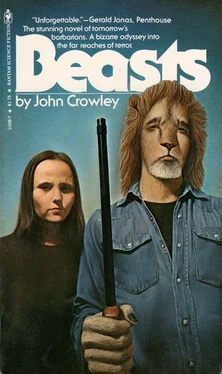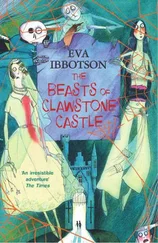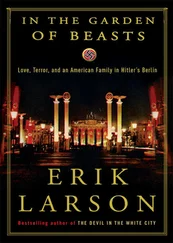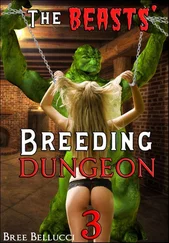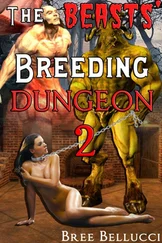“You don’t understand.” She lit a cigarette. “There are no formalities. What there is is an absolute ban on entering the Preserve at all, on whatever pretext. This is a protocol signed by the Federal and the Autonomy governments. It works this way: you ask permission to move onto the Preserve or enter the Mountain on what you call official business; and we refuse permission. That’s the way it works.” Twenty years of bribery, public pressure, and passive resistance had gone into those protocols and agreements; Roth knew where she stood.
“Excuse me, Director,” the man in black spoke. It was a tight little voice with an edge of repressed fury in it that was alarming. “We understand about permission. We’d like to put in a formal request. We’d like you to listen to our reasons. That’s what he meant.”
“Don’t call me Director,” Emma said.
“Isn’t that your title, your job description?”
“My name is Roth. And who are you?”
“My name is Barron,” he said quickly, as though offering in return for her name something equally useless. “Union for Social Engineering, Hybrid Species Project. I’m attached to these officers in an advisory capacity.”
She should have known. The cropped hair, the narrow, careless suit, the air of being a useful cog in a machine that had not yet been built. “Well.” The word fell on them with the full censorious weight of her great voice. “And what are these reasons.”
“How much do you know,” the USE man asked, “about the parasociety the leos have generated since they’ve been free-living?”
“Very little. I’m not sure I know what a parasociety is. They’re nomads…”
With a dismissive gesture whose impatience he couldn’t quite hide, Barron began to speak rapidly, his points tumbling over one another, stitched together with allusions to studies and statistics and court decisions Roth had never heard of. Out of the quick welling of his certainty, though, she did gather facts; facts that made her uncomfortable.
The leos’ only loyalty was to their pride. Whether they had inherited this trait from their lion ancestors or had consciously modeled themselves on lion society wasn’t known, because they felt no loyalty to the scientific community that had given them birth, and had freed them in order to study them, and so no human investigators were allowed among them to verify hypotheses. No human laws bound them. No borders were respected by them. Again, it was impossible to tell whether these attitudes were deliberate or the result of an intelligence too low to comprehend human values.
Smug, thought Roth: “an intelligence too low…” Couldn’t it be a heart too great?
Given a small population, Barron went on, and the fact of polygamy and extended families, young leos find it difficult to mate. At maturity, they usually leave or are thrown out of the pride. Their state of psychic tension can be imagined. Their connection to the pride, their only loyalty, has been broken. Aggressive, immensely strong, subhuman in intelligence, and out to prove their strength in the world, the young leos are completely uncontrollable and extremely violent. Barron could give her instances of violent crime — crime rates among this population as compared to an equivalent human group, resisting arrest for instance, assaulting an officer…
“Is this one you’re after,” Roth broke in, “one of these young ones?”
“That hasn’t been determined yet.”
“He is one of a pride, you know.” She wished instantly that she hadn’t said that. The officers exchanged looks; Roth could tell that in fact they hadn’t known. Yet why should she want to keep it secret? Only because the Mountain never gave away anything, no scrap even of information, to the outside society from which they took nothing? Anyway, it was out. “How did you come to learn he was in the Preserve?”
“We’re not at liberty to say,” said the USE man. “The information is reliable.” He leaned forward, lacing his fingers together; his eyes rifled earnestness at her relentlessly. “Director, I understand that you feel deeply about the inviolability of your area here. We respect that. We want to help you preserve it. This leo or leos are in violation of it. Now, you’re very peace-loving here” — a fleeting smile of complicity — and of course we interface with you there, USE is of course strictly pacifist. So we feel that these leos, who as we’ve pointed out are all armed and violent, can’t be handled by the means you have, which are peaceful and thus inadequate. The Federal government, then, is offering you aid in removing this violation of your space.
“Of course,” he concluded, “you do want the violation removed.”
For some reason, Emma saw in her mind Meric Landseer’s long patient fingers moving with fine sensitivity to find the flaw in an old, wellloved, much-used machine.
“I might point out also,” Barron said, since she remained silent, “that it’s part of your agreement with the Federal not to turn the Mountain into a refuge for criminals or lawbreakers.”
“We aren’t hiding them,” Roth said. “We can deal with them.”
“Can you?”
On her desk the ranger memo still lay: most of the long muscle stripped away, the rest in a high state of decomposition … She lit a cigarette from the stub of her last. “There’s no way,” she said, “that I can issue warrants or passports in my own name. You’ll have to wait. It could take time.” She looked at Barron. “We’re not very efficient decision-makers here.” She stood, strangely restless. She felt a hateful urgency, and wanted it not to show. “I suppose it’s possible for you to stay here for a few days until our own rangers and — other investigators have returned with what they’ve learned. We have a kind of guest-house.” In fact it was a quarantine quarters, as cheerless as a jail. That was fine with Roth.
Reluctantly, they agreed to wait. Roth began, with a slowness that obviously irritated them, to send messages and fill out passes. She thought: when bacteria invade you, you consciously invade your own body with antibiotics. Neither is pleasant. An ounce of prevention is worth a pound of cure. The pound of cure before her accepted glumly their highly restricted passes. Perhaps, possibly, thought Roth, the cure won’t be needed. Forgive us our trespasses , she prayed, as we forgive those who trespass against us; lead us not into temptation, but deliver us from evil ….
The creature Meric looked at was young. He couldn’t have said why that was apparent. He sat so calmly that Meric was tempted to stand up and walk over to him, smiling. He hadn’t known what he would feel on coming close to a leo — he had seen photographs, of course, but they were for the most part distant and vague and had only made him curious. He hadn’t expected, then, that his first impression would be of utter, still, unchallengeable beauty. It was an unearthly beauty that had something suffocating in its effect, an alien horror; but it was beauty.
“Hello,” he said, smiling; both the little word and the fatuous gesture fell hollowly far short of the leo, Meric felt. How could he come to him? “I mean no harm.” He was in fact harmless, defenseless even. He wondered whether it was possible for him to make himself clear to them. What if it wasn’t? Why had he supposed he would be invisible to them? What, anyway, had he come out to learn?
The leo stood, and without prelude or greeting walked in short, solid strides to where Meric was crouched by the stone fence. He came with the unappeasable purposiveness of evil things in dreams, right at Meric, his intentions unreadable, and Meric, as in a dream, couldn’t move or cry out, though he felt something like terror. He was about to fling his arms up before his face and cry out the nightmare-breaking cry, when the leo stopped and with an odd gentleness took the telephoto lens out of his hand. He looked at it carefully, batting a fly from before his face with a ponderous motion. Then he gave it back.
Читать дальше
